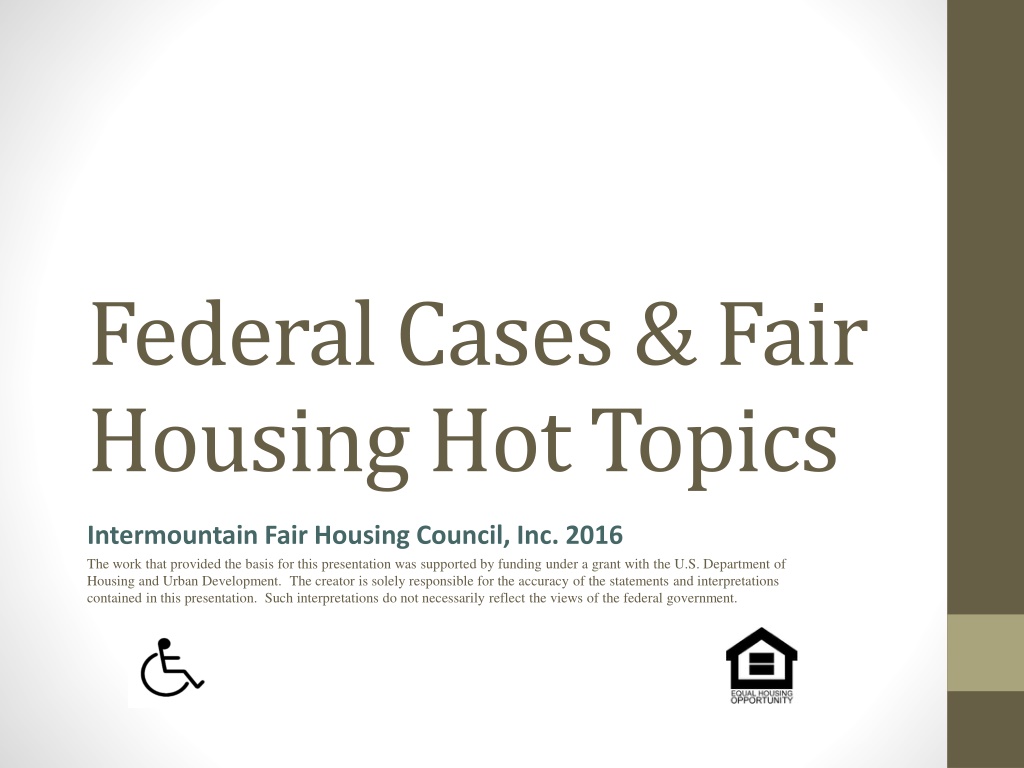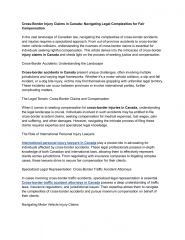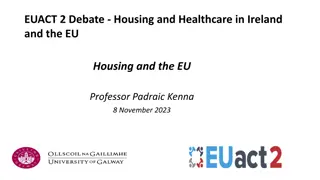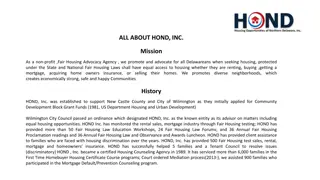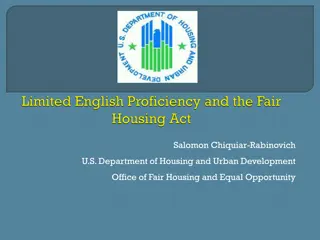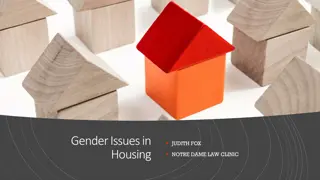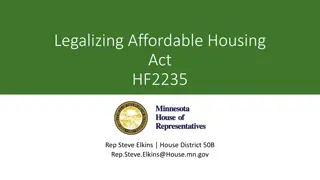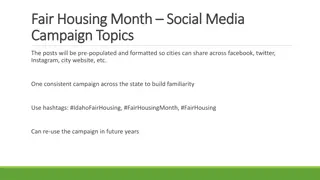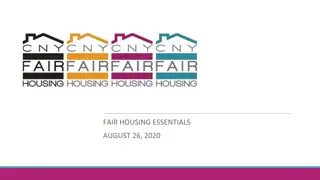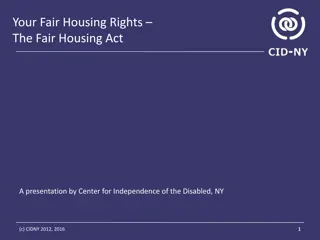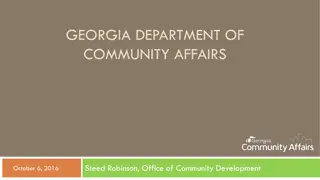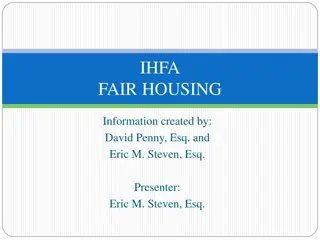Understanding Disparate Impact Claims in Fair Housing Cases
A presentation by the Intermountain Fair Housing Council covers recent federal cases related to fair housing, including the pivotal Texas Department of Housing case. The discussion includes insights on disparate impact analysis and the crucial role of such claims in enforcing the Affirmatively Furthering Fair Housing (AFFH) requirement set by HUD. Key points emphasize the need for a causal connection between policies and disparities, the necessity defense, and exploring alternatives to policies with adverse impacts.
Download Presentation

Please find below an Image/Link to download the presentation.
The content on the website is provided AS IS for your information and personal use only. It may not be sold, licensed, or shared on other websites without obtaining consent from the author. Download presentation by click this link. If you encounter any issues during the download, it is possible that the publisher has removed the file from their server.
E N D
Presentation Transcript
Federal Cases & Fair Housing Hot Topics Intermountain Fair Housing Council, Inc. 2016 The work that provided the basis for this presentation was supported by funding under a grant with the U.S. Department of Housing and Urban Development. The creator is solely responsible for the accuracy of the statements and interpretations contained in this presentation. Such interpretations do not necessarily reflect the views of the federal government.
Recent Federal Cases to Note 8/17/2024 2
Texas Department of Housing and Community Affairs v. The Inclusive Communities Project, Inc. On June 5, 2015, in a 5-4 split, the US Supreme Court held that disparate-impact claims are cognizable under the Fair Housing Act. 8/17/2024 The Court reaffirmed the consistent finding of the federal courts over the past four decades that the Fair Housing Act bars not only intentional discrimination, but also policies that have an unwarranted disparate impact. Courts have consistently recognized that policies and practices that unnecessarily limit housing opportunities or otherwise perpetuate segregation because of race, color, national origin, religion, sex, disability, or familial status violate the Fair Housing Act. 3
Disparate Impact Analysis Under the Court's ruling in Inclusive Communities, to prove a case of disparate impact housing discrimination, the following must occur: First, a plaintiff must make out a prima facie case, drawing an explicit, causal connection between a policy or practice and the disparate impact or statistical disparity. As Justice Kennedy wrote, "A disparate-impact claim relying on a statistical disparity must fail if the plaintiff cannot point to a defendant s policy or policies causing that disparity." Justice Kennedy also noted that "policies are not contrary to the disparate-impact requirement unless they are artificial, arbitrary, and unnecessary barriers. Second, a defendant must have the opportunity to prove that the policy is necessary to achieve a valid interest. If a defendant can't not prove that, then a plaintiff's claim of disparate impact must prevail. Finally, if a defendant has shown that the policy is necessary to achieve a valid interest, the plaintiff must then show that there is an available alternative . . . practice that has less disparate impact and serves the [entity s] legitimate needs. If a plaintiff cannot do so, then their disparate impact claim must fail. 4
Disparate Impact Claim & AFFH Review HUD s adoption of the final disparate impact rule in 2013 and the Supreme Court s ICP decision crucial tools for enforcement of the Affirmatively Furthering Fair Housing (AFFH) requirement In many cases, a disparate impact claim in federal court is a step that triggers HUD AFFH Review 5
NAACP v. Baltimore County In March 2016, the U.S. Department of Housing and Urban Development (HUD) today announced a settlement agreement with Baltimore County, Maryland to expand affordable housing in higher opportunity areas throughout the County. 8/17/2024 Baltimore County Branch of the NAACP, Baltimore Neighborhoods, Inc., a private non-profit fair housing organization, and three individuals, claiming that the County: 1) had not developed affordable housing in areas other than those that were concentrated by race and poverty; 2) focused only on providing rental housing for seniors rather than families; 3) adequate numbers of accessible units were unavailable to people with disabilities; and 4) its actions had failed to affirmatively further fair housing. 6
NAACP v. Baltimore County Baltimore County will: Invest $3 million annually for 10 years to create 1,000 affordable housing units through new construction or rehabilitation. The units will be geographically dispersed in neighborhoods that provide access to opportunity. At least 500 of the units will have three or more bedrooms to accommodate families with children and at least one-third of the units will be accessible and made available to people with disabilities. The units must be completed over a period of 12 years. Provide Housing Choice Vouchers to at least 2,000 families that will increase access to affordable housing across the county. 8/17/2024 7
NAACP v. Baltimore County Ensure all of its units comply with the accessibility requirements of the Fair Housing Act, and will provide an additional $300,000 annually for 10 years to finance structural modifications to make other affordable housing units in Baltimore County accessible. Proactively market the units to potential tenants who are least likely to apply, including African Americans families and families with a member who has a disability. The County will also run a mobility counseling program to offer expanded housing opportunities to families. Seek the enactment of legislation that prohibits discrimination based on source of income. Pay the three individual claimants $150,000 in monetary relief. 8/17/2024 8
Familial Status In February 2016, the U.S. Department of Housing and Urban Development (HUD) reached an agreement with a group of Connecticut landlords to resolve allegations they discriminated against families with children. 8/17/2024 HUD reached the agreement with New Britain-based Green New Britain, LLC, and PBJ Management, and their on-site property manager for allegedly refusing to rent a two-bedroom apartment to a single mother and her two young children. Green New Britain, LLC, will pay the mother $19,500 and modify its website to state that families with children are welcome. Green New Britain, LLC, also agreed to amend its advertising policy to clearly state that families with children are welcome, modify its leasing procedures to ensure that families with children are treated fairly, and have staff attend fair housing training. 9
Sex Discrimination March 16, 2016 Justice Department Files Sexual Harassment Lawsuit Against Owners and Property Managers of West Virginia Homes and Apartments The Justice Department filed a lawsuit against Gary Walden; the Estate of Tina Walden; Walden Homes LLC, dba Walden Rentals; and 973 Chestnut Ridge Road Inc. The lawsuit alleges that female tenants in residential rental properties owned and managed by the Waldens have been subjected to egregious sexual harassment and retaliation in violation of the Fair Housing Act. 8/17/2024 10
Design & Construction March 8, 2016 Justice Department Settles Disability-Based Housing Discrimination Lawsuit with Owners and Developers of 71 Apartment Complexes in Alabama, Georgia, North Carolina and Tennessee The owners and developers of 71 multi-family housing complexes in four states with more than 2,500 ground-floor units have agreed to pay $350,000 to settle claims that they violated the Fair Housing Act and the Americans with Disabilities Act by building apartment complexes that were inaccessible to persons with disabilities. As part of the settlement, the companies also agreed to make substantial retrofits to remove accessibility barriers. 8/17/2024 11
Religious Discrimination March 7, 2016 Justice Department Wins Religious Discrimination Lawsuit Against Colorado City, Arizona, and Hildale, Utah A federal jury in Phoenix returned a verdict finding that the towns of Colorado City, Arizona, and Hildale, Utah, and their joint water company systematically discriminated against individuals who are not members of the Fundamentalist Church of Jesus Christ of Latter-day Saints (FLDS) in the provision of housing, utility and policing services in violation of the Fair Housing Act. Prior to the jury verdict, the parties reached an agreement that the defendants will pay $1.6 million to resolve the monetary claim under the Fair Housing Act. 8/17/2024 12
Disability Discrimination March 4, 2016 Justice Department and City of Fort Worth, Texas, Settle Lawsuit Alleging Disability Discrimination The City of Fort Worth, Texas, had agreed to settle a lawsuit alleging that Fort Worth discriminated against persons with disabilities when it refused to allow a group home for individuals recovering from drug and alcohol addiction to operate in a single family residential zone in the city. 8/17/2024 Fort Worth will allow Ebby s Place to operate with up to seven residents and will rescind all the citations it had previously issued against the home. Fort Worth will also pay $135,000 to Ebby s Place in monetary damages and $10,000 to the United States as a civil penalty. As a part of the settlement, Fort Worth also adopted an ordinance establishing a process whereby persons may seek reasonable accommodations from the city s zoning or land use laws and practices, where such accommodations may be necessary to afford persons with disabilities an equal opportunity to use and enjoy their housing. 13
Race Discrimination February 29, 2016 Justice Department Settles Housing Discrimination Lawsuit Against Owner of North Fort Myers, Florida, Mobile Home and Recreational Vehicle Park 8/17/2024 The Justice Department announced today that Thomas Mere, the owner and operator of Mere s Mobile Home and Recreational Vehicle Park in North Fort Myers, Florida, has agreed to pay $40,000 to resolve allegations that he discriminated against African Americans in violation of the Fair Housing Act. The settlement, which is in the form of a consent order, must still be approved by the U.S. District Court for the Middle District of Florida. Under the settlement, the defendant will establish a settlement fund of $30,000 to compensate victims of his discriminatory practices and pay a civil penalty of $10,000 to the United States. The agreement also requires that the defendant implement nondiscriminatory application and rental procedures at the park, undergo fair-housing training and provide periodic reports to the department. 14
Fair Housing Issues in Idaho Statewide Multi-family housing complexes with design and construction violations; 8/17/2024 Denial of housing to veterans and seniors based on disability; Inability to use Veteran s Vouchers and subsidized housing vouchers by families with children, people of color, and people with disabilities; Denial of service animals/parking and reasonable accommodations; 15
Fair Housing Issues in Idaho Denial of families with children or overly restrictive rules; Segregation and steering based on race and national origin in Boise, Pocatello, Twin Falls, Nampa, and other cities; 8/17/2024 Discriminatory actions toward Middle Eastern persons in Pocatello, Idaho Falls and Twin Falls and anti-refugee sentiments in Boise, Twin Falls, Star, and North Idaho communities; Failure to provide language services to LEP consumers in subsidized housing and via housing counseling. 16
Fair Housing Issues in Idaho Blaming tenants based on national origin/race for bed bugs and cockroaches; 8/17/2024 Charging higher rents, deposits based on national origin; Failing to address environmental issues that impact a protected class; Mass evictions adversely affecting protected classes Using source of income, credit, criminal history to screen out prospective tenants/homebuyers 17
Fair Housing Issues in Idaho Housing Provider Fair Housing Issues: 8/17/2024 Housing providers finding their insurance terminated or increased if they rent to Section 8 tenants or other subsidized renters; Realtors and property managers being asked to enforce CCRs regarding pool, tennis court or other amenities in a discriminatory way against children; Realtors and property managers finding it hard to sell homes to families with children, people of color, or people with disabilities because of CCRs which prohibit or limit fences, size of home one can build, renters, group homes, businesses or their being in the community; 18
Fair Housing Issues in Idaho City, County, and State land use policies that present barriers to affordable housing, group homes, etc. which discriminate based on a protected class or have a disparate impact based on a protected classes; 8/17/2024 Certified Family Homes or Group Homes for persons with disabilities see insurance rates increased or require special insurance policies because persons with disabilities living there; Affordable housing developers cannot build in communities because homeowners/local governments block the building because of prejudice toward a protected class(es) or land use policies have a disparate impact. 19
Other cases/trends? Resources: 8/17/2024 U.S. Department of Housing and Urban Development (HUD) 1-800-669-9777 -or- 1-800-927-9275 (TDD) Intermountain Fair Housing Council (208) 383-0695 in Boise -or- 1-800-717-0695 (toll-free) 20
